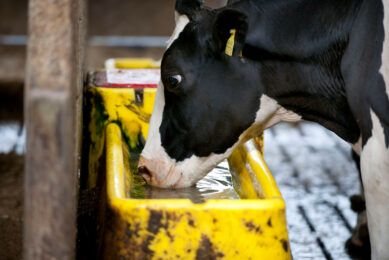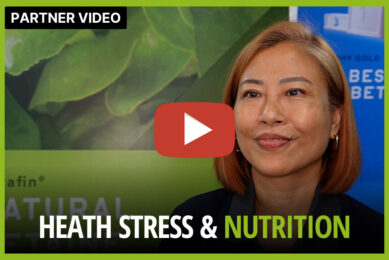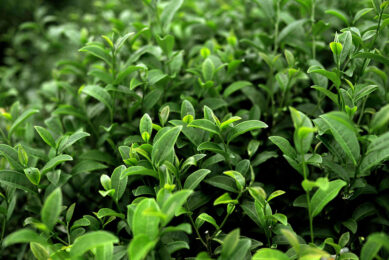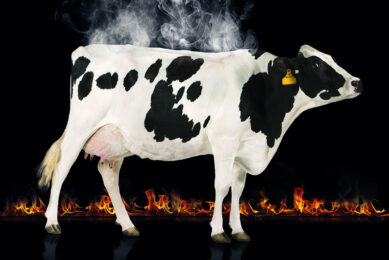Countering the effects of heat stress with natural betaine

Janet Remus, Technical Services Director North America at Danisco Animal Nutrition (IFF) explains how the dual action of natural betaine benefits animals experiencing heat stress and helps to maintain performance.
Hydration is more than a cellular issue. With 98% of all the molecules in the body affected by water, maintaining optimum hydration challenges the whole animal in terms of energy demands. When heat stress occurs, the energy needed to maintain cellular water balance goes up at the same time as the animal is also having to work hard to maintain productivity and survive the stress. So how can the multiple functions of natural betaine help producers improve efficiency?
Water regulation
Cells have no direct way to hold or control water movement, so water can move according to the concentration gradient prevailing at the time. However, because water is a crucial cellular component, nature has devised ways of manipulating its movement. The most commonly recognised method is through the use of ion pumps, such as sodium-potassium ATPase. They act to increase electrolyte levels (mainly potassium) in the cell to a level which is more concentrated than its hyperosmotic environment, and so minimises water movement. However, these pumps are mainly effective against short term stresses, rather than sustained pressure from dehydration. This is because high accumulation of potassium destabilises cellular enzymes, proteins and organelles; leading to a drop in cellular energy output at a rate that increases the longer the stress persists. This is when the functional benefits of Betafin natural betaine, come into play; providing a safe way to minimise cellular water loss at minimum energy cost.
The functions of natural betaine
A naturally-occurring osmolyte and methyl donor, natural betaine is an effective means of helping cells stay hydrated. It works by interacting with cellular water to maintain water balance. At the same time, it protects cellular organelles, enzymes and proteins and so enables these components to maintain normal functions despite the stresses caused by, for example, high environmental temperatures. By helping cells “cope” with dehydration in this way, natural betaine helps to prevent valuable energy being diverted away from growth and lean gain and so helps to maintain animal performance, despite the challenging conditions. Indeed, the presence of natural betaine has been shown to reduce the activity of ion pumps like Na/K ATPase and Ca2+ ATPase by 64% and 73% respectively. A significant energy saving given that these ion pumps can require up to 2 ATP to ultimately move one molecule of potassium into a cell.
Far reaching benefits
A strong body of evidence demonstrates a range of positive responses to Betafin natural betaine during heat stress among livestock. For example, studies on swine have found that natural betaine mitigates heat stress-related changes in intestinal permeability as measured by ileal transepithelial electrical resistance (TER expressed as AU) and ileal fluorescein isothiocyanate-labelled dextran permeability (APP; Figure 1). This is particularly important in the context of heat stress, when the gut becomes more leaky due in part to shifts in blood flow away from the core towards the skin.
In poultry, a series of trials (Table 1) illustrate the beneficial effects of natural betaine against key performance parameters including water retention, survival and feed conversion ratio (FCR). While a further study on broilers given natural betaine reported higher levels of water retention compared to non-treated birds exposed to cycling heat stress and/or coccidia challenge as stressors.
Equally significant is the effect of natural betaine on the milk yield of lactating dairy cows on pasture. One study reported an improvement of 6% with betaine supplementation at 2g/kg concentrate under ambient summer temperatures (Figure 2). Plus, milk protein and fat yields (g/day) also increased with betaine addition.
Furthermore, natural betaine has been shown to increase heat shock protein synthesis as part of thermal tolerance development. One study noted that heat stressed bovine mammary epithelial cells treated with betaine showed higher levels of heat shock proteins (HSP) 27 and 70 compared to non-supplemented controls. At the whole animal level, supplementation of 114 ng betaine/kg lactating cow weight was shown to increase blood leukocyte HSP 70 with no change in HSP 27.
Elsewhere, research also suggests a wider role for betaine supplementation during times of stress in terms of supporting gut microbial communities, improving respiration rate and rectal temperature, including noted effects in swine on supporting larger litters and shorter breeding intervals.
Multiple functions of natural betaine
The dual action of Betafin makes it a highly effective means of alleviating heat stress in animals. As an osmolyte, it helps to protect cells against water loss and dehydration. While its function as a methyl donor promotes regeneration of methionine in the liver, which allows optimised dietary addition of choline and/or methionine in livestock diets. Overall, the multiple functions of natural betaine make it a valuable addition to nutrition strategies designed to optimise livestock performance during these challenging conditions.
References are available on request







